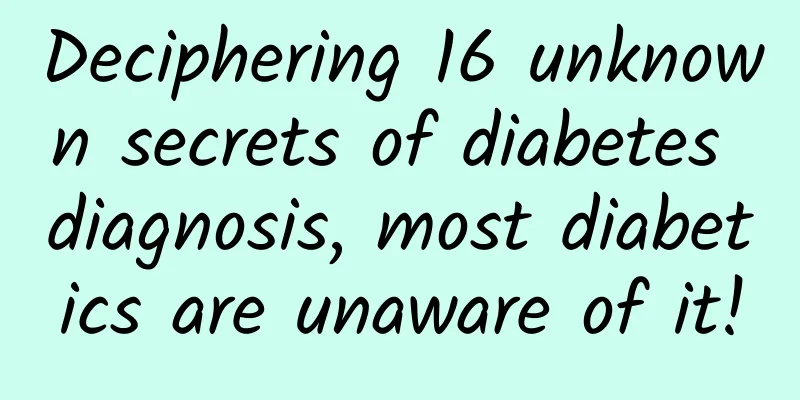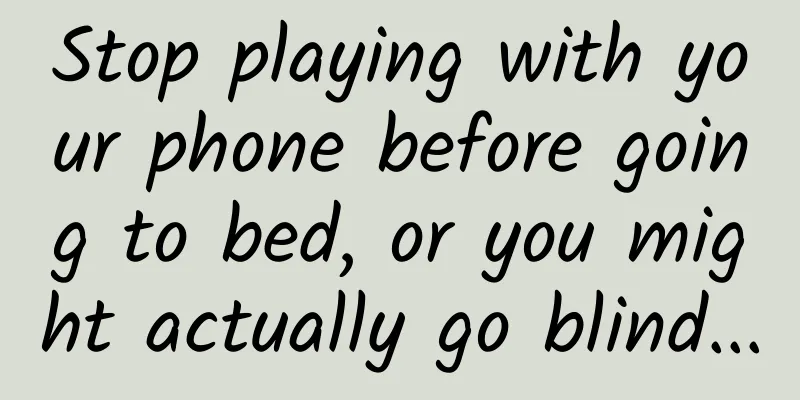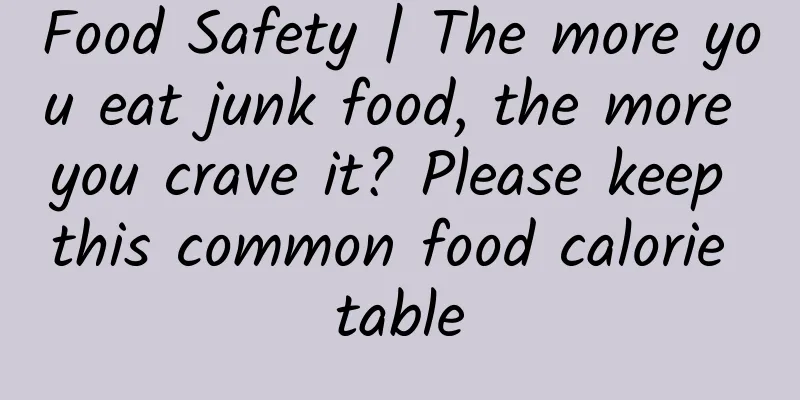Deciphering 16 unknown secrets of diabetes diagnosis, most diabetics are unaware of it!

|
Recently, I have found in my clinical practice that many patients still have misunderstandings about the diagnosis of diabetes. So I have sorted out some common questions and answered them in combination with the latest guidelines, hoping that this form can enhance readers' understanding of diabetes. 1. I was born in the 90s, so I definitely won’t get diabetes. A: The first wave of post-90s are already 35 years old. According to the latest guidelines, people aged 35 years and above are at high risk of diabetes. Even if they have no clinical symptoms, they should go for regular screening! 2.What are the symptoms of diabetes? A: The typical symptoms of diabetes are "three mores and one less", namely: thirst, frequent drinking, frequent urination, frequent eating, and unexplained weight loss. At the same time, diabetes also has some atypical symptoms, which vary from individual to individual. For example, some patients have no obvious symptoms even if their blood sugar is very high. Therefore, when there is something wrong with your body, you must go to the hospital for treatment, and do not judge on your own! 3. I measured my blood sugar with a home blood glucose meter and the result was 9.0mmol/L. Does this mean I have diabetes? A: Not necessarily. Home blood glucose meters measure fingertip blood glucose and can only be used for daily blood glucose monitoring, not for the diagnosis of diabetes. To diagnose diabetes, venous plasma blood glucose must be used. There may be something wrong with your blood glucose, and it is recommended that you go to the hospital for further testing. 4. I suspect I have diabetes. What do I need to check? A: In the eyes of doctors, there are three most critical blood sugar indicators for diagnosing diabetes: fasting blood sugar, 2-hour blood sugar in the oral glucose tolerance test (OGTT), and glycosylated hemoglobin (HbA1c). In addition, random blood sugar also has certain clinical significance. 5. Fasting blood sugar is the blood sugar measured before eating, and postprandial blood sugar is the blood sugar measured two hours after eating. A: No. Many patients have misunderstandings here, so let me talk about these concepts in detail. ➢Fasting blood sugar: Fasting is not simply "not eating". Fasting means not taking any calories for at least eight hours. "Eight hours" is easy to understand. The so-called "no calories" means not taking any protein, carbohydrates and fat. The staple food, vegetables, meat, fruits, alcohol, beverages, etc. that we usually eat all contain calories, so they should not be taken before measuring fasting blood sugar. It is important to remind you that when taking necessary medications such as antihypertensive drugs, drinking a small amount of water will not affect the monitoring results. The normal value of fasting blood sugar is less than 6.1mmol/L, and the reference lower limit of blood sugar is usually 3.9mmol/L. ➢ Post-meal blood sugar: Post-meal blood sugar is not measured 2 hours after a meal, but 2 hours after the first bite of food. Doctors use the 2-hour blood sugar of the glucose tolerance test (OGTT) to diagnose diabetes. It requires the person being examined to drink 75 grams of glucose within five minutes, and then measure their blood sugar two hours after drinking the glucose. The normal blood glucose value of 2h in glucose tolerance test (OGTT) is <7.8mmol/L. ➢ Glycated hemoglobin (HbA1c): It is used to reflect the average blood sugar control level of the patient in the past 2 to 3 months. It is worth noting that the presence of some diseases can cause errors in glycated hemoglobin. The normal value of glycosylated hemoglobin (HbA1c) in the normal population is 4%-6%. ➢ Random blood sugar: refers to the blood sugar at any time of the day, regardless of the last meal time. 6. My urine test showed that the glucose level was 2+. Does this mean I have diabetes? A: Not necessarily. Urine sugar can be affected by many factors, so it is not certain whether you have diabetes. It is recommended that you go to a doctor to check your blood sugar index. 7.What are the diagnostic criteria for diabetes? Answer: Diagnosis of diabetes requires a combination of clinical symptoms and laboratory tests, as shown in Figure 1: 8. I have lost weight recently. I went to the hospital and checked my fasting blood sugar, which was 5.0mmol/L. Can this rule out diabetes? A: No. If you have typical symptoms of diabetes, to confirm whether you have diabetes, you should also combine the 2-hour blood sugar and glycosylated hemoglobin (HbA1c) of the glucose tolerance test (OGTT). It is easy to miss the diagnosis if you only test fasting blood sugar. 9. I measured my fasting blood sugar at 6.8mmol/L and my postprandial blood sugar at 7.0mmol/L. Does this mean I have diabetes? A: No. The Expert Consensus on Prediabetes Intervention in Chinese Adults (2023 Edition) divides prediabetes into three types, and you belong to the impaired fasting glucose type. As shown in Figure 2: 10. Prediabetes is not diabetes, so I can and don’t have to do anything about it. A: No. Prediabetes is only one step away from diabetes. You need to monitor your blood sugar regularly and start to pay attention to changing your lifestyle, such as losing weight, reducing energy intake, limiting salt, exercising, etc. If there is no obvious effect after 6 months of intervention, you can consider using medication. 11. My random blood sugar level is 8.0mmol/L. Is this prediabetes? A: Not necessarily. Random blood glucose cannot be used to diagnose impaired fasting glucose and impaired glucose tolerance. You need to recheck fasting blood glucose and oral glucose tolerance test (OGTT) 2h blood glucose. 12. I measured a random blood sugar level of 13.0mmol/L. Does this mean I have diabetes? A: Not necessarily. Random blood sugar is more than 11.1mmol/L. It depends on whether there are typical symptoms of diabetes. If there are symptoms, it can be diagnosed as diabetes; if there are no symptoms, other blood sugar indicators need to be tested. 13. Our pre-employment physical examination requires a glucose tolerance test. I am afraid that there will be problems. Is it okay for me to not eat staple foods for a few days in advance? A: No. Fasting or excessive carbohydrate restriction may cause a false increase in blood sugar levels during the OGTT. The correct approach is to ensure that you eat at least 150 grams of carbohydrates per day for the three days before the OGTT. 14. I have anemia and my HbA1c is 5.0%. Can I rule out diabetes? A: Not necessarily. HbA1c cannot be used as the basis for diagnosing diabetes in the following situations: sickle cell disease, pregnancy (mid- to late-term), glucose-6-phosphate dehydrogenase deficiency, AIDS, hemodialysis, recent blood loss or blood transfusion, erythropoietin treatment, etc. 15. I was hospitalized due to pneumonia two days ago. The hospital measured my blood sugar and it was 13.0mmol/L. Am I diabetic? A: Not necessarily. Temporary blood sugar rise may occur in acute infection, trauma or other stressful situations, but the blood sugar level at this time cannot be used to diagnose diabetes. A repeat test is required after the stress factor is eliminated to confirm. 16.How many types of diabetes are there? How can I tell which type I have? A: Diabetes is divided into four types according to the cause, namely: type 1 diabetes (T1DM), type 2 diabetes (T2DM), special types of diabetes and gestational diabetes, of which type 2 diabetes (T2DM) accounts for more than 90%. Determining the type of diabetes requires a series of professional examinations. If it cannot be determined in a short period of time, a temporary type can be made first, and then blood sugar can be actively controlled. I hope that by answering these common questions, everyone will have a deeper understanding of the diagnosis of diabetes. The author once again reminds readers that if you have any concerns about your physical condition, please be sure to consult a professional doctor in time and do not make your own judgments or take medicine blindly. |
>>: World Rare Disease Day | Nutritional management protects the life of patients with rare diseases
Recommend
Alkaline phosphatase
I believe that most of us are not very familiar w...
I had an amniocentesis for a minor cold
Before pregnant women undergo amniocentesis, they...
Lower abdominal pain towards the end of menstruation
Most women who have had their periods should know...
How to apply glass glue to make it beautiful and good-looking? What to use to scrape after applying glass glue
Glass glue is a common household adhesive, compos...
Can I have a tooth extracted during pregnancy?
Women during pregnancy will pay great attention t...
How long does it take to get menstruation after giving birth?
There are many things that women need to pay atte...
Breast pain that comes and goes
Many people often feel a dull pain in the breast ...
Is it normal for leucorrhea to be watery and odorless?
Many women have little understanding of leucorrhe...
What are the side effects and precautions after taking birth control pills?
Many women think that if they want to avoid pregn...
Why do I get bloated during sex?
During sexual intercourse, women often experience...
Can I eat bread after a caesarean section?
Women are very weak after giving birth, so they n...
World Sleep Day | Can’t sleep during the afternoon? Here’s everything you want to know about naps!
Today is World Sleep Day. Many people are concern...
There are fleshy bumps next to the nipples
Many people find that there are many small bumps ...
Is there any relationship between small breasts and poor spleen and stomach?
Small breasts are a problem that many girls have,...
Is love of sleep really a disease? Charity art exhibition, free sleep clinic, dream graffiti, this science + art sharing will take us into the "rare dream"...
Do you know that there is a group of children who...









